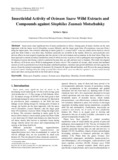Insecticidal Activity of Ocimum Suave Willd Extracts and Compounds against Sitophilus Zeamais Motschulsky
Abstract
Insect pests cause significant loss of maize production in Africa. Among pests of maize, beetles are the most important, with the maize weevil (Sitophilus zeamais Motsch.) and the larger grain borer (Prostephanus truncatus Horn.) being the major pests. The extensive tunneling in maize grain by S. zeamais and P. trancatus adults allows them to convert grain into flour within a very short time. Synthetic pesticides are available in the market. However, such pesticides have adverse effects on non-targeted organisms and also persist in the environment and accumulate in the food chain. Plant have been reported to contain secondary metabolites some of which are toxic to pests as well as pathogenic microorganism The use of botanical in pests and disease control is preferred because they are safe and non-toxic to humans. This study investigated the efficacy of Ocimum suave Willd in management of maize weevil. The essential oil, hexane, ethyl acetate and methanol extracts as well as powdered leaves from the plant exhibited repellence, mortality and growth inhibition activities against the insects. From the isolated compounds, β-sitosterol (1), β-amyrin (3), lupeol (4) and betulinic acid (5) were the most promising in weevil control. Findings from this study revealed that extracts of O. suave are effective against S. zeamais which destroy maize and other cereal grains both in the field and in storage.
Collections
- Journal Articles (PAS) [273]

